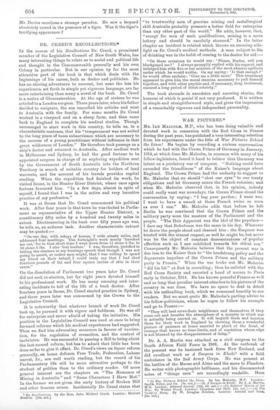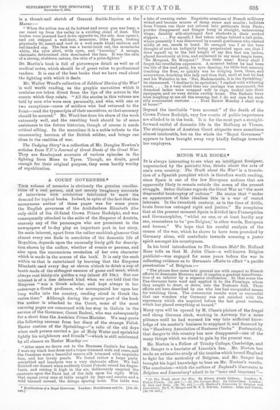WAR PICTURES.* ME. IAN MALCOLM, M.P., who has been doing
valuable and devoted work in connexion with the Red Cross in France during the past year, has published a. very interesting selection from his experiences under the title of War Pictures Behind the Lines.1 He begins by recording a curious conversation which he had with the Crown Prince of Germany in January, 1914, at which time Mr. Malcolm, in common with many of his fellow-legislators, found it hard to believe that Germany was intent on a predatory war of conquest. "Nothing could have exceeded the friendliness" of the Kaiser's language about England. The Crown Prince had the audacity to suggest to Mr. Malcolm that we should " shut our eyes " to our treaty obligations and let Germany annex the French colonies; and when Mr. Malcolm observed that, in his opinion, nobody could really want war nowadays, the Crown Prince closed the conversation by saying : " I beg your pardon ; I want war. I want to have a smack at those French swine as soon as ever I can." Mr. Malcolm adds that before he left Berlin he was convinced that the Crown Prince and the military party were the masters of the Parliament and the people. "The Heir Apparent was the idol of the populace— I dare say that Rehoboam was the same in his day. Wherever he drove the people stood and cheered him : the Emperor was treated with the utmost respect, as well he might be, but never was he the object of constant demonstrations of popular affection such as I saw exhibited towards his eldest son." Consequently Mr. Malcolm believes that the present war is due less to the Kaiser than to "the headstrong policy and the degenerate impulses of the Crown Prince and the military party in Prussia." When the war broke out mr.
"did his bit" at first in recruiting; then he enlisted with the Red Cross Society and escorted a band of nurses to Paris early in October, 1914. He has known peaceful France so well and so long that peculiar interest attaches to his picture of the country in war time. We have no space to deal in detail with his enthralling book, which we commend heartily to our readers. But we must quote Mr. Malcolm's parting advice to his fellow-politicians, whom he urges to follow his example and go to France "They will best serve their neighbours and themselves if they come out and breathe the atmosphere of a country in which war is actually being carried on. It will inspirit them and hearten them for their work in England by showing them a wonderful picture of patience at home married to pluck at the front, of courage that knows no time-limits, and of resolution whose edge is not blunted by the disappointment of delay."
Dr. A. A. Martin was attached as a civil surgeon to the South African Field Force in 1901. At the outbreak of the present war he hastened back from New Zealand, and did excellent work as A Surgeon in Khaki' with a field ambulance in. the 2nd Army Corps. He was present at the battles of the Marne and Aisne and the move to Flanders. He writes with photographic brilliance, and his disconnected notes of "things seen" are exceedingly readable. Here • (1) War Pictures Behind the Lines. By Ian Malcolm, M.P. London : Smith, Elder, and Co. [68. net.]—(2) A Surgeon in Khaki. By A. A. Martin. M.D. London Edward Arnold. [10e. 6d. net.]—(3) Soldier( Stories o‘ the War. By Walter Wood. London: Chapman and Hall. [Os. net,]—(4 The Undying Story BY W. Douglas Newton, London: Jarrold and one, [6s. net.]
is a thumb-nail sketch of General Smith-Dorrien at the Marne :-
" When the action was at its hottest and every gun was busy, a car raced up from the valley in a swirling cloud of dust. The brakes were jammed hard down opposite us, the side door opened, and out stepped a well-knit, muscular, litho figure, looking physically fit, smart and cool in a well-made khaki uniform and red-banded cap. The face was a burnt-brick red, the moustache white, the eyes alert, wide open, and knowing.' A savage, obstinate, determined chin dominated the face. It was the chin of a strong, stubborn nature, the chin of a prize-fighter."
Dr. Martin's book is full of picturesque detail as well as of medical notes, which should be of great value to professional readers. It is one of the best books that we have read about the fighting with which it deals.
Mr. Walter Wood's collection of Soldiers' Stories of the War2 is well worth reading, as the graphic narratives which it contains are taken direct from the lips of the actors in the events which they relate. "All the stories in this volume are told by men who were seen personally, and who, with one or two exceptions—cases of soldiers who had returned to the
front—read the typescripts of their narratives, so that accuracy should be secured." Mr. Wood has done his share of the work extremely well, and the resulting book should be of some assistance to the future historian, though of course it needs critical sifting. In the meantime it is a noble tribute to the unassuming heroism of the British soldier, and brings one close to the realities of war.
The Undying Story' is a collection of Mr. Douglas Newton's articles from T.P.'s Journal of Great Deeds of the Great War. They are flamboyant accounts of various episodes in the fighting from Mons to Ypres. Though, no doubt, good
enough for their original purpose, they seem hardly worthy -of republication.

















































 Previous page
Previous page